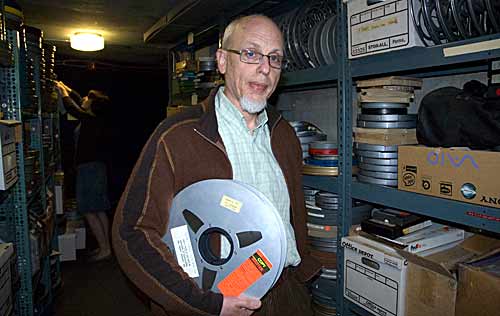 |
Steve Seid (Wendy Edelstein) |
It's my job
Steve Seid, Video curator, Pacific Film Archive
| 28 August 2009
BERKELEY — Steve Seid began his career writing about film and video, and working for small, independent video-arts organizations and film festivals before coming to the Pacific Film Archive 21 years ago. At the beginning of his stint at Berkeley, he helped build the PFAís video collection, works on tape that he now helps preserve in digital formats. Long before Seid entered the world of film, he studied literature, which he calls ďthe only worthwhile discipline.Ē
Q. You curate the quirkier programs at the PFA. Why is that?
A. I like to think of myself as one of the people who does archaeology in the dumpsters as much as in the archives. If you look at film history, 95 percent of cinema is junk and 5 percent of it is great. For every Godard or Fellini, there are a hundred directors making bad films behind them. Iím attracted to the hundred bad filmmakers as well, because theyíre also part of cinema.
Q. Whatís it like to put together a series?
A. Itís a kind of detective work. Say you do an Otto Preminger retrospective: The prints will have come from diverse sources with ambiguous rights that you have to seek out and negotiate. By the end, youíve done dozens of negotiations for a series that should look completely coherent to the audience ó one single filmmaker and his films.
Q. People might think you spend all your time watching films. Are they wrong?
A. No, because I actually do spend a lot of time watching films. Thereís a lack of division between my private life and my work life, because when I go home I watch movies.
Q. That sounds like fun.
A. It can be a labor. Most people watch films for pleasure. Often I watch films that arenít to my liking because I need to be abreast of movements in the field. Thatís very different from having dinner and then going to the cineplex to have a carefree experience.
Q. What is challenging about your job?
A. Promoting the notion of coming together in a public space to sit in front of a screen with other people and enjoying cinema. We donít show the latest Tom Cruise film here. We show cinema that is often unfamiliar, overlooked, or in great need of revival. Thereís a kind of coaxing and education that we do. Itís a constant challenge to renew the audience and to encourage our brand of aesthetic experience over the many distractions culture has to offer.
Q. What do you like best about your job?
A. What I like most has little to do with film or video. Iím attracted to ideas but somehow I ended up in a world of moving images, and so I pursue how ideas are expressed within culture by using film. That doesnít mean I devalue cinema itself, but its ability to carry forth the consciousness of a culture is what Iím most delighted by.

